Complete the sentences with your own words:

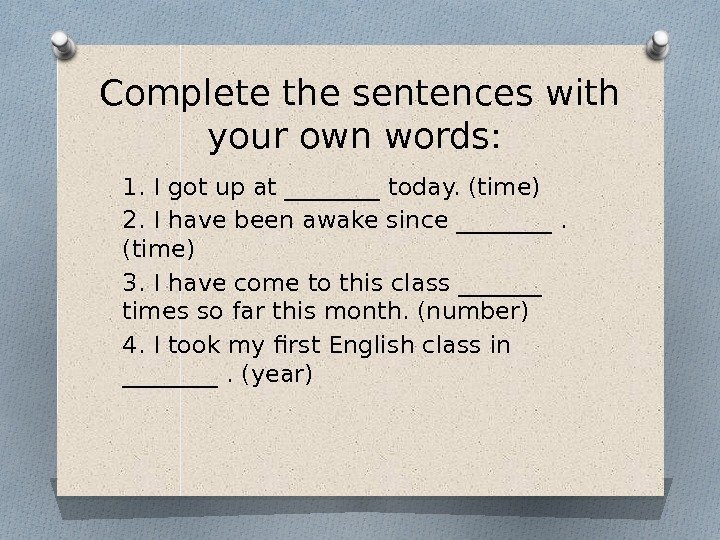
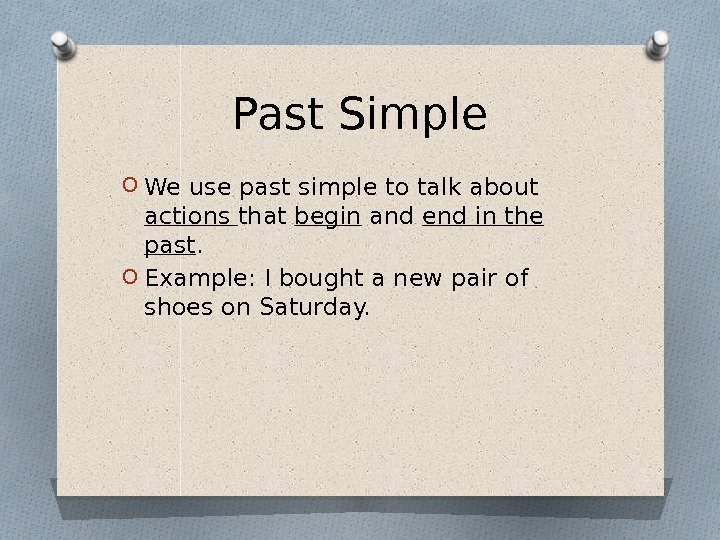
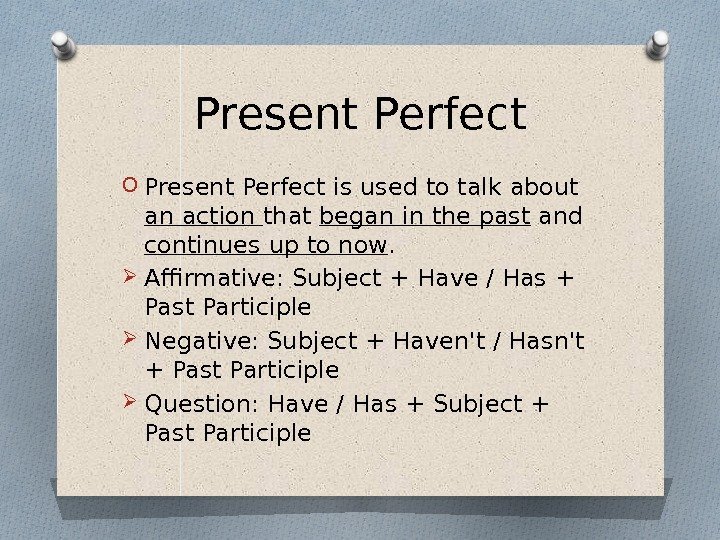
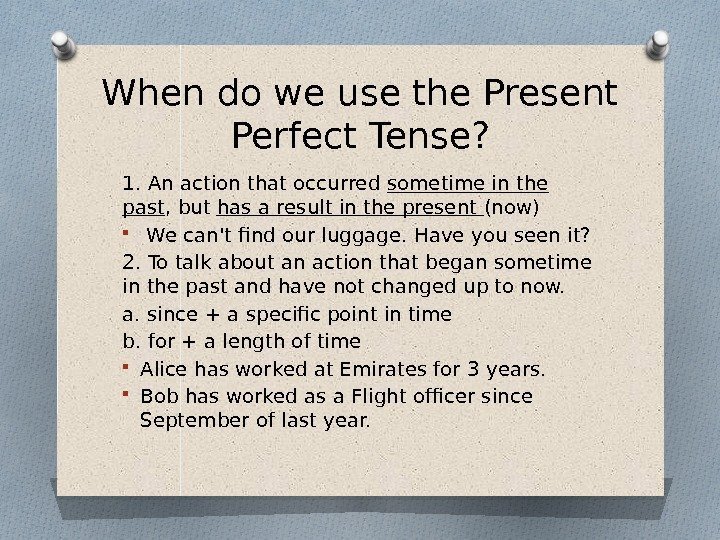
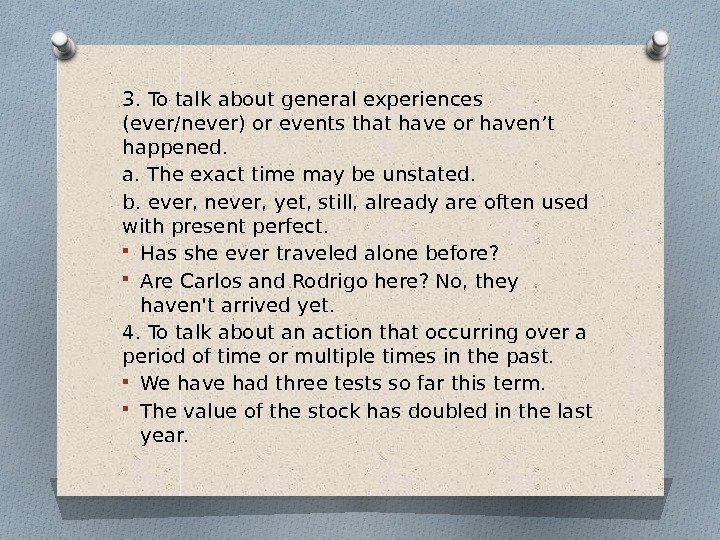
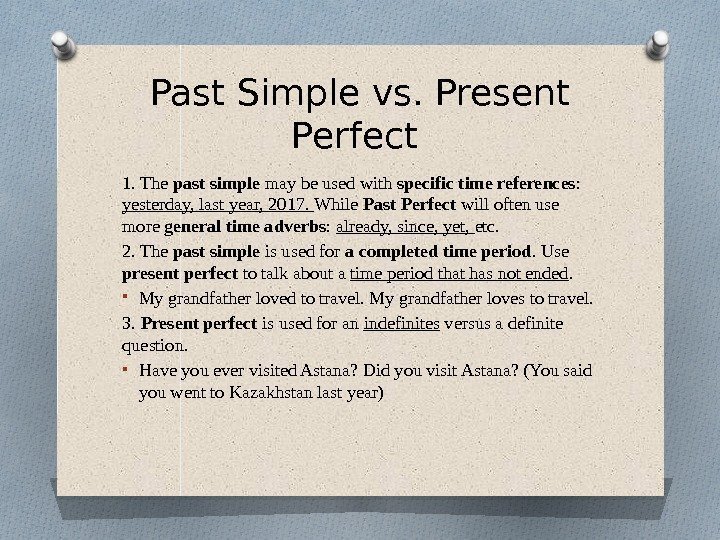
lesson_3.grammar.pptx
- Размер: 799.2 Кб
- Автор: Алтынай Мурзакулова
- Количество слайдов: 7
Описание презентации Complete the sentences with your own words: по слайдам

 Complete the sentences with your own words: 1. I got up at ____ today. (time) 2. I have been awake since ____. (time) 3. I have come to this class _______ times so far this month. (number) 4. I took my first English class in ____. (year)
Complete the sentences with your own words: 1. I got up at ____ today. (time) 2. I have been awake since ____. (time) 3. I have come to this class _______ times so far this month. (number) 4. I took my first English class in ____. (year)
 Past Simple O We use past simple to talk about actions that begin and end in the past. O Example: I bought a new pair of shoes on Saturday.
Past Simple O We use past simple to talk about actions that begin and end in the past. O Example: I bought a new pair of shoes on Saturday.
 Present Perfect O Present Perfect is used to talk about an action that began in the past and continues up to now. Affirmative: Subject + Have / Has + Past Participle Negative: Subject + Haven’t / Hasn’t + Past Participle Question: Have / Has + Subject + Past Participle
Present Perfect O Present Perfect is used to talk about an action that began in the past and continues up to now. Affirmative: Subject + Have / Has + Past Participle Negative: Subject + Haven’t / Hasn’t + Past Participle Question: Have / Has + Subject + Past Participle
 When do we use the Present Perfect Tense? 1. An action that occurred sometime in the past , but has a result in the present (now) We can’t find our luggage. Have you seen it? 2. To talk about an action that began sometime in the past and have not changed up to now. a. since + a specific point in time b. for + a length of time Alice has worked at Emirates for 3 years. Bob has worked as a Flight officer since September of last year.
When do we use the Present Perfect Tense? 1. An action that occurred sometime in the past , but has a result in the present (now) We can’t find our luggage. Have you seen it? 2. To talk about an action that began sometime in the past and have not changed up to now. a. since + a specific point in time b. for + a length of time Alice has worked at Emirates for 3 years. Bob has worked as a Flight officer since September of last year.
 3. To talk about general experiences (ever/never) or events that have or haven’t happened. a. The exact time may be unstated. b. ever, never, yet, still, already are often used with present perfect. Has she ever traveled alone before? Are Carlos and Rodrigo here? No, they haven’t arrived yet. 4. To talk about an action that occurring over a period of time or multiple times in the past. We have had three tests so far this term. The value of the stock has doubled in the last year.
3. To talk about general experiences (ever/never) or events that have or haven’t happened. a. The exact time may be unstated. b. ever, never, yet, still, already are often used with present perfect. Has she ever traveled alone before? Are Carlos and Rodrigo here? No, they haven’t arrived yet. 4. To talk about an action that occurring over a period of time or multiple times in the past. We have had three tests so far this term. The value of the stock has doubled in the last year.
 Past Simple vs. Present Perfect 1. The past simple may be used with specific time references : yesterday, last year, 2017. While Past Perfect will often use more general time adverbs : already, since, yet, etc. 2. The past simple is used for a completed time period. Use present perfect to talk about a time period that has not ended. My grandfather loved to travel. My grandfather loves to travel. 3. Present perfect is used for an indefinites versus a definite question. Have you ever visited Astana? Did you visit Astana? (You said you went to Kazakhstan last year)
Past Simple vs. Present Perfect 1. The past simple may be used with specific time references : yesterday, last year, 2017. While Past Perfect will often use more general time adverbs : already, since, yet, etc. 2. The past simple is used for a completed time period. Use present perfect to talk about a time period that has not ended. My grandfather loved to travel. My grandfather loves to travel. 3. Present perfect is used for an indefinites versus a definite question. Have you ever visited Astana? Did you visit Astana? (You said you went to Kazakhstan last year)
